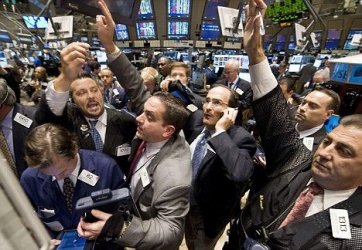- Sep 22, 2013
- 4,956
- 250
- 85
This is a media-culture vignette inspired by Warren Beatty's Bulworth.
Cheers (signing off),

====
The marketing of iconic capitalism logos such as Mobilgas, Lucky Strike cigarettes, and Wrigley's chewing-gum made it 'chic' for consumers to embrace the 'spirit' of consumerism and capitalism in a world gauged by traffic and merchandising. Planet Hollywood, the movie-based restaurant chain, was a symbol of humanity's appreciation of the entertainment industry and consumerism in general. After 9/11, however, people became paranoid about optimism towards global commerce.

The marketing of patriotism-themed comics and films such as G.I. Joe: A Real American Hero (Hasbro/Marvel) and The Patriot in the new era reminded American audiences of the general social value of open social dialogue about the contouring of politics with idealism. Consumerism was catering to political ideology. It was as if the entertainment industry was 'vending' forms of nationalism, but this was not Nazi Germany --- this was democratic advertising.

On Wall Street, traders enthusiastically traded iconic brands worldwide and helped the DJIA stay at high levels in the 21st Century. Meanwhile, Hollywood (USA) was churning out countless vigilantism-fantasy themed comics-adapted films such as Iron Man and Marvel's Avengers. Lucifer Morningstar (DC Comics), an allusion to the Christian Devil (Lucifer) was a 'comic book star' and was featured in a new series called Lucifer (Fox TV). It seemed 'natural' to market values in a commerce-oriented 'First World imaginarium.'

In this climate, anime films and cartoons geared towards more mature audiences presented more controversial subject such as rape, racism, and riots in urban hell-holes. The Christian Coalition had to comment on the 'liberal' proliferation of such crime-paranoia imagery in this age of media and free-speech. Some Christian scholars wondered if humanity's interest in robotics and A.I. in the age of computers prompted radical new concepts about the 'experimentation' with ethics and extinction itself.

There was much money to be made in the dominion of controversial issues in this seemingly 'robotic universe' of constant graphic imagery production regarding the intrigue surrounding traffic, globalization, multiculturalism, and of course, capitalism. In such a 'robo-universe' one might wonder if Christian ads during the Super Bowl (NFL) represented mankind's interest in the merchandising of imagination itself. In other words, was mysticism becoming more...accessible?

The greatest concern in the age of media is censorship, so the distribution of graphic images and pornography is of great worry to people in positions of authority (e.g., politicians and religious pundits). What did fundamentalist Muslims think of American consumers celebrating Playboy and Victoria's Secret? What did the new terrorist group ISIS think of Hollywood (USA) making films like Fight Club, Celebrity, and Sin City? Would all this racy entertainment contribute anything to the cauldron of racism (and fascism)?

Modernism-symbolic cartoons and animated films/anime from around the world such as Saber-Rider and the Star Sheriffs, Space Adventure: Cobra, Ghost in the Shell, Transformers, and Robotech reminded audiences of our newfound fascination with liberalism in media (e.g., feminism in storytelling). In other words, there were dollars and intrigue to be found in the arena of theater and anime, and religious groups (e.g., Christian Coalition) did not want to fall behind, so they endorsed religion-centric networks such as EWTN (Catholic-TV). How would terrorism undermine all this 'creative progress' (in terms of culture-exchange)?

A time-traveler named Max Sterling was originally from Venus and discovered in his planet's history that the reason the beings of Venus were humanoid was because years ago, humans and Venus-inhabitants co-mingled in the time of Ancient Egypt. Max traveled from the future back to Earth's past, to the 21st Century --- to 'TrumpUSA' --- and disguised himself as a journalist working for the Washington Post and decided to interview U.S. First Lady Melania Trump about the aesthetics of new millennium 'magazine-consciousness' (e.g., People Magazine, Vanity Fair, GQ, TIME, National Geographic, etc., etc.). Max was an ace galactic pilot and wanted to know what Melania thought about the development of intellectual imagination(!).

MAX: Are you a fan of video-games?
MELANIA: I like Microsoft's Xbox!
MAX: Are you a fan of Apple Computers (Steve Jobs)?
MELANIA: I'm impressed with the marketing of iPhones!
MAX: Has intellect advanced towards useful marketing?
MELANIA: I like the links between technology and business.
MAX: In other words, tech for business is good for the human mind...
MELANIA: I believe so!
MAX: Do you think all ethnic groups have access to such toys?
MELANIA: The Internet offers portals to the modern mind...
MAX: What's your take on WikiLeaks?
MELANIA: There's certainly controversy surrounding intellectual property!
MAX: Is the U.S. government obligated to tell consumers about espionage?
MELANIA: I think President Trump keeps contact with the people through social media.
MAX: In other words, you believe modern politicians do care about consumer daydreams.
MELANIA: Yes, just as much as marketing engineers (e.g., Bill Gates) care about products!
MAX: Will modern media reorient humanity's interests in materials and goods?
MELANIA: If it does, that might forge peaceful bridges of commerce (e.g., fast-food).
MAX: There's a Burger King in Afghanistan now!
MELANIA: Yes, and I credit President Trump for forwarding optimism towards bazaars.
MAX: Maybe Consumer Reports magazine symbolizes 'modern cunning.'
MELANIA: Maybe...

After Max Sterling concluded his interview of U.S. First Lady Melania Trump, he thanked her and left the White House, concluding that 21st Century American capitalism was much about aesthetics, ideology, networking, and design. If consumerism was to mature beyond the 'young stage' of propaganda-based enthusiasm (e.g., MTV), Americans would have to understand how pluralism and racism were integrated into the media landscape. Max traveled back to his own time and told his peers there that Americans under 'TrumpUSA' were surprisingly conscious about aesthetics-oriented piracy dangers (e.g., WikiLeaks). Would capitalism ever become a potent standard for universal humanitarianism?
====


Cheers (signing off),

====
The marketing of iconic capitalism logos such as Mobilgas, Lucky Strike cigarettes, and Wrigley's chewing-gum made it 'chic' for consumers to embrace the 'spirit' of consumerism and capitalism in a world gauged by traffic and merchandising. Planet Hollywood, the movie-based restaurant chain, was a symbol of humanity's appreciation of the entertainment industry and consumerism in general. After 9/11, however, people became paranoid about optimism towards global commerce.

The marketing of patriotism-themed comics and films such as G.I. Joe: A Real American Hero (Hasbro/Marvel) and The Patriot in the new era reminded American audiences of the general social value of open social dialogue about the contouring of politics with idealism. Consumerism was catering to political ideology. It was as if the entertainment industry was 'vending' forms of nationalism, but this was not Nazi Germany --- this was democratic advertising.

On Wall Street, traders enthusiastically traded iconic brands worldwide and helped the DJIA stay at high levels in the 21st Century. Meanwhile, Hollywood (USA) was churning out countless vigilantism-fantasy themed comics-adapted films such as Iron Man and Marvel's Avengers. Lucifer Morningstar (DC Comics), an allusion to the Christian Devil (Lucifer) was a 'comic book star' and was featured in a new series called Lucifer (Fox TV). It seemed 'natural' to market values in a commerce-oriented 'First World imaginarium.'

In this climate, anime films and cartoons geared towards more mature audiences presented more controversial subject such as rape, racism, and riots in urban hell-holes. The Christian Coalition had to comment on the 'liberal' proliferation of such crime-paranoia imagery in this age of media and free-speech. Some Christian scholars wondered if humanity's interest in robotics and A.I. in the age of computers prompted radical new concepts about the 'experimentation' with ethics and extinction itself.

There was much money to be made in the dominion of controversial issues in this seemingly 'robotic universe' of constant graphic imagery production regarding the intrigue surrounding traffic, globalization, multiculturalism, and of course, capitalism. In such a 'robo-universe' one might wonder if Christian ads during the Super Bowl (NFL) represented mankind's interest in the merchandising of imagination itself. In other words, was mysticism becoming more...accessible?
The greatest concern in the age of media is censorship, so the distribution of graphic images and pornography is of great worry to people in positions of authority (e.g., politicians and religious pundits). What did fundamentalist Muslims think of American consumers celebrating Playboy and Victoria's Secret? What did the new terrorist group ISIS think of Hollywood (USA) making films like Fight Club, Celebrity, and Sin City? Would all this racy entertainment contribute anything to the cauldron of racism (and fascism)?

Modernism-symbolic cartoons and animated films/anime from around the world such as Saber-Rider and the Star Sheriffs, Space Adventure: Cobra, Ghost in the Shell, Transformers, and Robotech reminded audiences of our newfound fascination with liberalism in media (e.g., feminism in storytelling). In other words, there were dollars and intrigue to be found in the arena of theater and anime, and religious groups (e.g., Christian Coalition) did not want to fall behind, so they endorsed religion-centric networks such as EWTN (Catholic-TV). How would terrorism undermine all this 'creative progress' (in terms of culture-exchange)?
A time-traveler named Max Sterling was originally from Venus and discovered in his planet's history that the reason the beings of Venus were humanoid was because years ago, humans and Venus-inhabitants co-mingled in the time of Ancient Egypt. Max traveled from the future back to Earth's past, to the 21st Century --- to 'TrumpUSA' --- and disguised himself as a journalist working for the Washington Post and decided to interview U.S. First Lady Melania Trump about the aesthetics of new millennium 'magazine-consciousness' (e.g., People Magazine, Vanity Fair, GQ, TIME, National Geographic, etc., etc.). Max was an ace galactic pilot and wanted to know what Melania thought about the development of intellectual imagination(!).

MAX: Are you a fan of video-games?
MELANIA: I like Microsoft's Xbox!
MAX: Are you a fan of Apple Computers (Steve Jobs)?
MELANIA: I'm impressed with the marketing of iPhones!
MAX: Has intellect advanced towards useful marketing?
MELANIA: I like the links between technology and business.
MAX: In other words, tech for business is good for the human mind...
MELANIA: I believe so!
MAX: Do you think all ethnic groups have access to such toys?
MELANIA: The Internet offers portals to the modern mind...
MAX: What's your take on WikiLeaks?
MELANIA: There's certainly controversy surrounding intellectual property!
MAX: Is the U.S. government obligated to tell consumers about espionage?
MELANIA: I think President Trump keeps contact with the people through social media.
MAX: In other words, you believe modern politicians do care about consumer daydreams.
MELANIA: Yes, just as much as marketing engineers (e.g., Bill Gates) care about products!
MAX: Will modern media reorient humanity's interests in materials and goods?
MELANIA: If it does, that might forge peaceful bridges of commerce (e.g., fast-food).
MAX: There's a Burger King in Afghanistan now!
MELANIA: Yes, and I credit President Trump for forwarding optimism towards bazaars.
MAX: Maybe Consumer Reports magazine symbolizes 'modern cunning.'
MELANIA: Maybe...

After Max Sterling concluded his interview of U.S. First Lady Melania Trump, he thanked her and left the White House, concluding that 21st Century American capitalism was much about aesthetics, ideology, networking, and design. If consumerism was to mature beyond the 'young stage' of propaganda-based enthusiasm (e.g., MTV), Americans would have to understand how pluralism and racism were integrated into the media landscape. Max traveled back to his own time and told his peers there that Americans under 'TrumpUSA' were surprisingly conscious about aesthetics-oriented piracy dangers (e.g., WikiLeaks). Would capitalism ever become a potent standard for universal humanitarianism?
====

